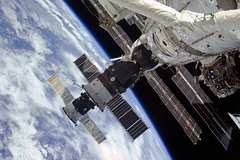Scientists will send muscles into space to study the aging processes of the body
Scientists intend to reveal the secret of aging after studying the muscles sent into space. This is reported by Sky News.
Experts from the University of Liverpool intend to send fragments of human muscles into space to analyze the effect of weightlessness on the human body. Muscle cells the size of a grain of rice will be in special containers printed on a 3D printer. The shipment of cargo from the Kennedy Space Center in Florida to the International Space Station (ISS) will take place on Tuesday, December 21.
The prototype will be in Earth orbit until January 2022. All this time, a small current will be supplied through the muscle fragment, stimulating tissue contraction. Scientists believe that in space there is a process similar to the aging of the body, which causes the muscles to weaken. A similar laboratory sample of human tissue will help specialists in the study.
"Every cosmonaut on the ISS trains for at least 2.5 hours every day and, despite this, loses quite a significant amount of muscle," said Professor Malcolm Jackson. The study can explain the nuances of aging and suggest how to slow down this process.
It is clarified that the equipment for the experiment was manufactured by Kayser Space from Oxfordshire. It will ensure the safety of samples and protect against temperature fluctuations and overloads. The research was funded by the UK Space Agency (UKSA), which allocated 12 million pounds, or about 1.17 billion rubles.
In mid-December, Russian scientists found out how to maintain muscle functions in zero gravity and fight atrophy. Experts suggested stimulating the muscles with an injection of L-Name, an inhibitor of the enzyme NO-synthase.

